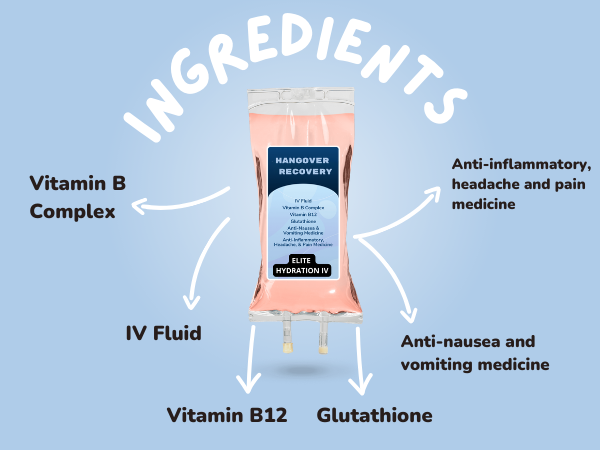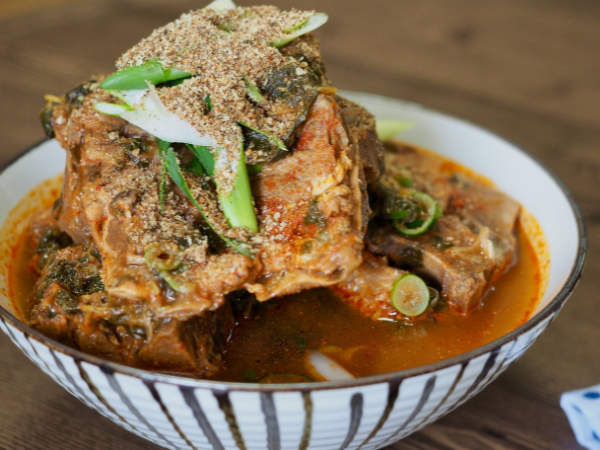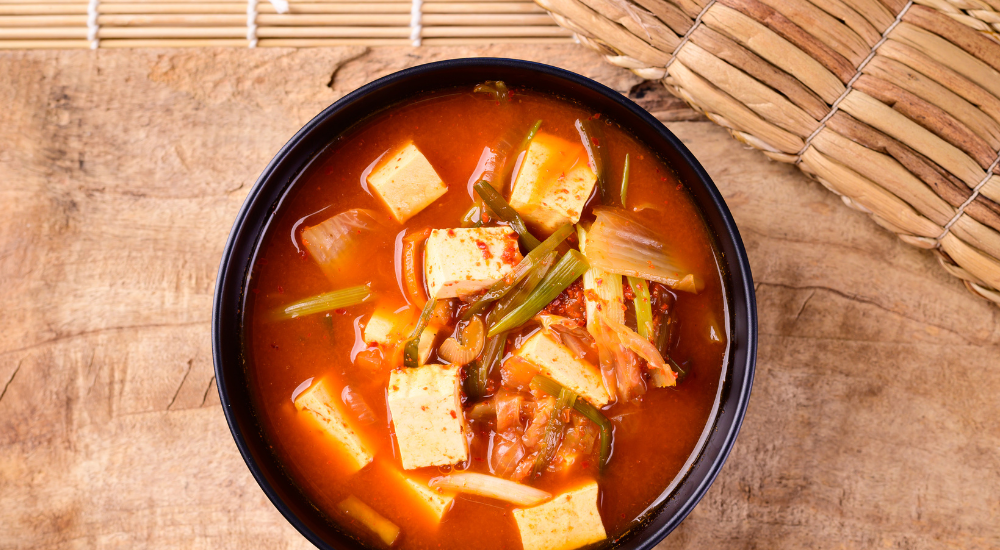Korean hangover soup, known as Haejangguk, may alleviate hangover symptoms. Its ingredients are thought to restore electrolyte and fluid balance.
Hangover cures are a universal quest after a night of indulgence, and Korea’s Haejangguk is a traditional remedy many swear by. This hearty soup typically features a rich, savory broth, vegetables, and often, meat, which can help replenish nutrients and rehydrate the body.
Served piping hot, it’s not only a comfort food but also a cultural staple that’s believed to detoxify and revitalize. Packed with vitamins and minerals from ingredients like Napa cabbage, bean sprouts, and radish, Korean hangover soup is a nutritious option for those seeking relief. With its balance of flavor and health benefits, Haejangguk is not just a meal but a restorative experience for those recovering from a hangover.
What Is Korean Hangover Soup?
Have you ever heard of Korean Hangover Soup? It’s a magical dish that helps after a night of fun. This soup, known in Korea as Haejangguk, brings comfort to those feeling the effects of too much drink. It is full of ingredients that help your body recover. Let’s dive into what makes this soup a must-try and its place in Korean culture.
Ingredients And Preparation
The magic of Korean Hangover Soup lies in its ingredients and how it’s made. Here’s a breakdown:
- Broth: A rich, meaty broth is the base. It’s made from boiling beef or pork bones for hours.
- Vegetables: Common veggies include napa cabbage, bean sprouts, radishes, and scallions. They add vitamins and crunch.
- Protein: Slices of beef or pork give the soup substance and help replenish protein.
- Seasoning: Garlic, soy sauce, and chili pepper add depth and a spicy kick to wake up your senses.
Preparing this soup starts with simmering the bones to create a flavorful broth. Then, the meat and vegetables are added and cooked until tender. Finally, the seasoning is adjusted to taste, making a comforting bowl ready to enjoy.
Cultural Significance
The role of Korean Hangover Soup goes beyond just curing hangovers. It’s a dish steeped in history and culture. Here’s why:
- A Morning Ritual: In Korea, this soup is often eaten in the morning after a night out. It’s a way to start the day right and shake off the night before.
- Family and Friends: Sharing a pot of Haejangguk is common among groups. It’s a moment to come together, share stories, and enjoy each other’s company.
- Festivals and Celebrations: During holidays and festivals, when indulgence is common, this soup plays a key role. It’s a reminder of balance and taking care of oneself.
Every spoonful of Korean Hangover Soup is not just a remedy but a celebration of Korean tradition and communal spirit. Whether it’s the rich, hearty broth or the gathering of loved ones, this dish holds a special place in the hearts of many.

The Best Solution Hangover IV Therapy
The Hangover IV Drip Package rapidly rehydrates and replenishes essential vitamins. It alleviates hangover symptoms efficiently.
Effects On Hangover
Do you wonder if Korean hangover soup can beat your hangover? Let’s dive into how it works. This soup is a magic mix of hydration and nutrition. It battles hangover symptoms head-on. Let’s see how it does this amazing job.
Hydration
First, let’s talk about hydration. Alcohol makes you lose a lot of water. This leads to dehydration, a big cause of hangover symptoms. Korean hangover soup is mostly liquid. So, it puts back the water your body lost. Drinking this soup can make you feel better quickly. But there’s more to it than just water. The soup also has salt and other minerals. These help your body keep the water you drink. This means you get hydrated faster and stay that way. Let’s break down why hydration is key:
- Replaces lost fluids: Drinking alcohol causes you to pee more, which leads to losing fluids. The soup helps replace them.
- Helps with headaches: Dehydration can cause headaches. More fluids can ease this pain.
- Boosts recovery: With enough water, your body cleans out toxins faster. This speeds up your recovery.
So, sipping on Korean hangover soup gives your body the hydration boost it needs. It’s a simple step with big benefits.
Nutritional Benefits
Now, let’s explore the nutritional benefits. Korean hangover soup is more than just water. It’s packed with nutrients. These nutrients support your body’s recovery after a night out. They fuel your body’s healing process. Here are some of the key nutrients you’ll find in the soup:
- Vitamins: Vitamins B and C are common. They help break down alcohol in your body.
- Minerals: Minerals like magnesium and potassium are also in the soup. They balance your body’s fluids.
- Protein: The soup often has meat or tofu. This gives you protein, which rebuilds body tissues.
Together, these nutrients do a lot for you. They help fix the damage done by alcohol. They also make you feel stronger and more alert. So, eating Korean hangover soup not only hydrates you but also nourishes your body. It’s a tasty way to bounce back after drinking.
Scientific Perspective
Korean hangover soup, known as Haejangguk, often comes up in talks about after-party remedies. Let’s explore this from a scientific perspective. Does this soup actually ease hangover symptoms? Science has a few insights on how food and drink can affect alcohol’s impact on the body.
Impact On Alcohol Metabolism
When we look at the impact on alcohol metabolism, it’s important to understand how the body processes alcohol. The liver works hard to break down alcohol using enzymes. Nutrients in hangover soup might support this process. Let’s break it down:
- Protein: Aids in enzyme function.
- B-vitamins: Help convert alcohol to energy.
- Amino acids: Can repair liver damage from alcohol.
Hangover soup often includes ingredients rich in these nutrients. It might give your liver a little boost. See the table below for common components and their potential benefits:
| Ingredient | Nutrient | Benefit |
|---|---|---|
| Beef broth | Protein, Amino acids | Supports liver enzymes, tissue repair |
| Napa cabbage | Vitamin C | Antioxidant that can reduce hangover severity |
| Fermented kimchi | Probiotics, B-vitamins | Aids digestion, helps metabolize alcohol |
Role Of Electrolytes
Alcohol can lead to dehydration by making you urinate more. This loss of fluids also means you lose electrolytes, which are key for hydration and nerve function. Hangover soup might help replace these lost electrolytes. Here’s how:
- Sodium: Helps retain water and maintain nerve function.
- Potassium: Vital for heart and muscle function.
These electrolytes are found in the salty broth and vegetables of the soup. They help rehydrate your body and could reduce hangover effects. Check out the list below for an idea of what the soup provides:
| Electrolyte | Source in Soup | Hangover Benefit |
|---|---|---|
| Sodium | Broth, seasoned vegetables | Helps with water retention, nerve signals |
| Potassium | Vegetables, meat | Supports heart function and muscle contractions |

Comparative Analysis
Korean hangover soup, known as Haejangguk, is famous for its hangover-curing properties. This traditional remedy has been a part of Korean culture for centuries. But how does it stack up against Western hangover remedies? Let’s dive into a comparative analysis to understand the benefits and differences.
Against Western Remedies
Western hangover cures often include over-the-counter painkillers, greasy food, and sports drinks. Haejangguk takes a different approach. It’s a nutrient-rich soup that rehydrates and replenishes the body. Here’s why it stands out:
- Rehydration: Haejangguk’s broth is packed with electrolytes, aiding in hydration.
- Detoxification: Ingredients like Napa cabbage and bean sprouts support liver function.
- Digestive Aid: Fermented ingredients, such as kimchi, boost gut health.
A comparison between Haejangguk and Western remedies shows clear differences in approach. See the table below for a simple breakdown:
| Haejangguk | Western Remedies |
|---|---|
| Natural ingredients | Synthetic painkillers |
| Hydrating broth | Sports drinks |
| Probiotic elements | Greasy foods |
Popular Korean Variations
Haejangguk has many variations across Korea. Each region adds its unique twist. Some popular versions include:
- Seoul-style: Made with ox bones, brisket, and coagulated ox blood.
- Jeonju-style: Contains bean sprouts, radish, and egg for added nutrition.
- Busan-style: Known for its generous use of seafood and spicy broth.
These variations not only offer diverse tastes but also different health benefits. Here’s a glimpse of what each variation brings to the table:
| Variation | Main Ingredients | Benefits |
|---|---|---|
| Seoul-style | Ox bones, brisket, ox blood | Rich in protein and iron |
| Jeonju-style | Bean sprouts, radish, egg | Boosts metabolism, aids digestion |
| Busan-style | Seafood, spicy broth | High in omega-3s, anti-inflammatory |
Consumption Recommendations
Korean Hangover Soup, known as Haejangguk, is a go-to remedy for many after a night of fun. It’s hearty, spicy, and brimming with ingredients meant to re-energize the body. Let’s dive into the best ways to consume this soup for maximum hangover relief.
Timing
When it comes to hangovers, timing is everything. Here’s what you need to know:
- Prevention is Key: Eat the soup before your night out to fortify your stomach.
- Early Morning: Have it first thing to kick-start your recovery process.
- Late Breakfast: If you wake up late, Haejangguk can still help replenish lost nutrients.
Remember, the goal is to replenish and rehydrate. Check out this handy table for quick timing tips:
| Time of Day | Effectiveness |
|---|---|
| Before Drinking | Preventive |
| Morning After | High |
| Noon or Later | Moderate |
Frequency
How often should you turn to Haejangguk? Let’s find out:
- Not Just for Hangovers: Enjoy this soup even on days without hangovers for its health benefits.
- Moderation Matters: Limit intake to avoid too much spice or salt.
- Listen to Your Body: If you crave it often, your body might need the nutrients.
Keep in mind, balance is crucial. Here’s a guide for how often to consume this healing soup:
| Scenario | Recommended Frequency |
|---|---|
| After Heavy Drinking | Next Morning |
| Weekly Health Routine | 1-2 Times a Week |
| Daily Diet | Occasionally |
Eat Haejangguk mindfully for the best results. It’s not just a quick fix but a wholesome dish to enjoy regularly.
Alternatives
Korean Hangover Soup, known as Haejangguk, often promises relief after a night of heavy drinking. But what if you’re not near a Korean eatery or can’t stomach a soup? Exploring alternatives is key to finding your post-celebration solace.
Iv Hangover Therapy
When soup isn’t an option, IV Hangover Therapy steps in as a modern remedy. This clinical approach replenishes fluids and nutrients directly into your bloodstream. It’s known for its quick effectiveness, tackling symptoms like dehydration and headaches. Here’s what to expect:
- Fast Rehydration: IV drips deliver saline solution to combat dehydration.
- Vitamin Boost: A cocktail of vitamins, often including B and C, can rejuvenate your system.
- Medication: Anti-nausea and anti-inflammatory meds are often included to ease discomfort.
Consider the following table comparing IV therapy and Korean Hangover Soup:
| Aspect | IV Hangover Therapy | Korean Hangover Soup |
|---|---|---|
| Speed | Immediate | Varies |
| Ingredients | Vitamins, Medications | Natural Broth, Veggies, Meat |
| Accessibility | Medical Clinics | Korean Restaurants, Home Cooking |
| Cost | Higher | Lower |
While IV therapy offers a scientific edge, it’s not for everyone. It requires a clinic visit and can be costly. Always consult a healthcare professional before trying new treatments, especially if you have underlying health conditions.






